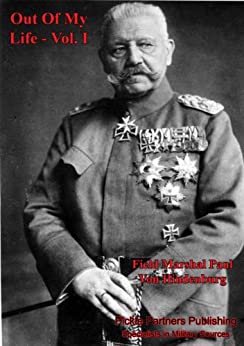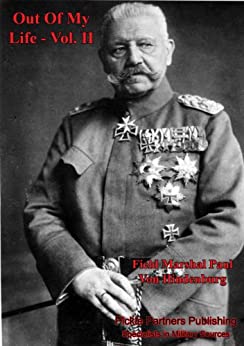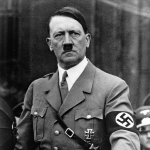Background
Paul von Hindenburg was born on 2 October 1847 in Posen, Prussia (now Poznan, Poland). Hindenburg was the son of a Prussian officer of old Junker (aristocratic) stock. His mother, however, was from a middle-class family.

1860
Paul von Hindenburg as a cadet in Wahlstatt (1860)
1917
Paul von Hindenburg, 1917.
1917
Field Marshal Hindenburg and General Ludendorff in 1917.
Paul von Hindenburg, 1928.
Depiction of Hindenburg and Erich Ludendorff at the battle of Tannenberg (painting by Hugo Vogel).
Kaiser Wilhelm II and Hindenburg






















(Field-Marshal Paul von Hindenburg is a well-known figure ...)
Field-Marshal Paul von Hindenburg is a well-known figure to world history; the supreme war-lord of Germany for many years of the First World War and conservative figure-head of post-war Germany. Although not of noble birth he rose through the ranks of the pre-war Prussian army, seeing much service in the Prussian-Austrian war of 1866 and the Franco-Prussian war of 1870. He believed his career over and retired in 1913 before being reactivated for the conflict that would become the First World War. He was assigned to the Eastern Front to combat the Russian armies. Forging a successful partnership with his staff officers, such as Max Hoffmann and Erich Ludendorff who dealt with much of the operational planning, he won the epic victories over the Russians at the battles of Tannenberg and the Masurian Lakes. Feted as a national hero after these victories and further successes in 1915, he was summoned to take charge on the Western front in 1916. He would mastermind the defensive strategy of the German army in 1916 and 1917 before committing the Germany army to the last throw of the dice in the 1918 German offensive.
https://www.amazon.com/Out-Life-Marshal-Hindenburg-Vol-ebook/dp/B06XGJDF1Y/ref=sr_1_2?dchild=1&keywords=Paul+von+Hindenburg&qid=1615970725&sr=8-2
1920

(Field-Marshal Paul von Hindenburg is a well-known figure ...)
Field-Marshal Paul von Hindenburg is a well-known figure in world history; the supreme war-lord of Germany for many years of the First World War and conservative figurehead of the post-war Germany. Although not of noble birth he rose through the ranks of the pre-war Prussian army, seeing much service in the Prussian-Austrian war of 1866 and the Franco-Prussian war of 1870. He believed his career over and retired in 1913 before being reactivated for the conflict that would become the First World War. He was assigned to the Eastern Front to combat the Russian armies. Forging a successful partnership with his staff officers, such as Max Hoffmann and Erich Ludendorff who dealt with much of the operational planning, he won the epic victories over the Russians at the battles of Tannenberg and the Masurian Lakes. Feted as a national hero after these victories and further successes in 1915, he was summoned to take charge on the Western front in 1916. He would mastermind the defensive strategy of the German army in 1916 and 1917 before committing the Germany army to the last throw of the dice in the 1918 German offensive. His memoirs are essential reading for anyone interested in the motivations of the German High command during the First World War.
https://www.amazon.com/Out-Life-Marshal-Hindenburg-Vol-ebook/dp/B06XGNCVDN/ref=sr_1_3?dchild=1&keywords=Paul+von+Hindenburg&qid=1615970725&sr=8-3
1920
Paul von Hindenburg was born on 2 October 1847 in Posen, Prussia (now Poznan, Poland). Hindenburg was the son of a Prussian officer of old Junker (aristocratic) stock. His mother, however, was from a middle-class family.
Paul von Hindenburg was trined at the Prussian Cadet Corps.
A cadet at the age of 11, he served in the Austro-Prussian (Seven Weeks’) War of 1866 and in the Franco-German War of 1870–71. He retired as a general in 1911 after an honorable but not especially distinguished career.
As an experienced officer, Hindenburg was recalled to active duty shortly after the outbreak of World War I and sent to command the 8th Army on the Eastern front with the extremely talented but highly temperamental Erich Ludendorff as his chief of staff. On the morning after its arrival on the front, the new command team commenced the Battle of Tannenburg (August 26-29), which resulted in the most decisive German victory on the Eastern front and made its official victors, Hindenburg and Ludendorff, into almost legendary German heroes. In this battle the German forces virtually annihilated a Russian army twice the size of the German detachment and cleared East Prussian territory for the balance of the war. By November 1914 Hindenburg had advanced to supreme commander in the east with the rank of field marshal.
When the German armies were increasingly driven into the defensive on the decisive Western front in the summer of 1916, Hindenburg was made chief of general staff, with Ludendorff at his side as chief of operations. Thus Hindenburg and Ludendorff - with the latter always in the driver's position - increasingly determined the direction of German politics. Their policy consisted primarily of a stubborn, increasingly suicidal insistence on an all-out military effort and sizable annexations and a wooden resistance to all reforms at home. For the German military fortunes, however, even the unification of the supreme command of the Central Powers under Hindenburg and desperate all-out offensives in the west were not enough. By the summer of 1918 German offensive strength had run out, and an Allied counteroffensive, reinforced by fresh American troops, threatened to carry the war into Germany.
The subsequent surrender did not diminish Hindenburg's prestige, however. He prepared what he believed to be the temporary resignation of the emperor, William II, to make an armistice possible. He gained the lasting gratitude of his nation by bringing every German soldier across the armistice line along the Rhine before the deadline set by the Allies. Only after the signing of the Peace Treaty of Versailles did he finally lay down his command - still the most popular public figure in Germany.
In April 1925, after the death of Friedrich Ebert, Hindenburg was elected the republic’s second president, despite his professed monarchism. He adhered, if not to the spirit, then at least to the letter of the republican constitution. Yet his personal confidants, among them especially Maj. Gen. Kurt von Schleicher, longed for a new authoritarian regime and urged him to use his prestige and render the government more independent of parliamentary controls. Though tired of the frequent Cabinet crises, Hindenburg, fearful of any unconstitutional action and of added responsibilities, procrastinated.
When the Depression set in and the government again broke up, he did appoint a Cabinet resting on his, rather than on the Reichstag’s (parliament’s), confidence. He authorized Chancellor Heinrich Brüning to dissolve the Reichstag should it prove uncooperative and promised to issue emergency decrees in lieu of Reichstag-enacted laws. The Reichstag was dissolved in July 1930; new elections produced an even less cooperative successor, in which the antiparliamentarian National Socialists emerged as the second largest party. Brüning now governed almost exclusively by decree. Since the president’s signature was required on each decree, however, Hindenburg could veto any governmental decision. Increasingly feeble, moody, and influenced by his military and landowning friends, the Marshal forced the government to spend huge amounts on the army and navy and hopelessly indebted estates at the expense of unemployment relief and other imperative needs. At the same time, Brüning’s deflationist policies aggravated the economic difficulties. Unrest, sparked above all by the Nazis, kept mounting.
When Hindenburg’s presidential term expired in April 1932, he ran again for the presidency as the only candidate who could defeat Hitler. He was reelected but mainly by the support of Brüning’s Catholic Center Party and the Social Democrats, rather than the conservative nationalist circles, to whom he felt closest and who now supported Hitler. Those who did vote for him clung to him as a bulwark against Nazi lawlessness and brutality. Yet the President’s confidants considered the Nazis a useful, if unpleasant, movement with whom they were sure they could come to terms. They saw in Brüning an obstacle to such accommodation and persuaded the Marshal to dismiss the Chancellor, who had just helped to reelect him.
Two successive governments, one headed by Franz von Papen, a former cavalry officer, the other by Schleicher, failed to win the support of the Nazis. Hitler insisted on becoming chancellor in any government in which his party participated, but, despite a deluge of petitions and letters, Hindenburg, who distrusted Hitler’s noisy aggressiveness, would not concede him that post. In November 1932, however, when the Nazis lost 10 percent of their vote in new Reichstag elections, Papen and Hitler agreed on forming a government with Hitler as chancellor, Papen as vice chancellor, and non-Nazis in most other posts. Hindenburg was assured by Papen that Hitler could easily be controlled. When Schleicher failed in his efforts to obtain parliamentary support for his government, Hindenburg, frustrated and tired, asked for his resignation. On January 30, 1933, Hindenburg appointed Hitler chancellor of a new Cabinet in which only two other Nazis, Wilhelm Frick and Hermann Göring, held offices.
Papen’s safeguards proved ineffective. Hitler quickly secured almost unlimited political power through terror, manipulations, and false promises. Hindenburg on his part accommodated himself to the new situation and, in effect, became a warm supporter of Hitler, although making an occasional innocuous gesture that seemed to set him apart from the Führer and the Nazi Party. At the time of his death, Hindenburg was still a revered, though remote, national figure.
Paul von Hindenburg went down in history as both and statesman. He fought in the Austro-Prussian War and in the Franco-German War, and retired as a general in 1911. Recalled to duty at the start of World War I, Hindenburg shared power with Erich Ludendorff as commander of the Eighth Army and then as chief of the General Staff. A national hero for his early victories, Hindenburg later drew the United States into battle with his use of submarine warfare. After retiring again in 1919, he became president of the Weimar Republic in 1925, and died shortly after naming Adolf Hitler the German chancellor.
(Field-Marshal Paul von Hindenburg is a well-known figure ...)
1920(Field-Marshal Paul von Hindenburg is a well-known figure ...)
1920Paul von Hindenburg was brought up in a Lutheran family and was deeply religious.
Politically, Hindenburg remained committed to a government dominated by the Prussian monarchy. He loathed liberalism, socialism, and the Social Democratic Party (SPD) and doubted that democratic parliamentary government could ever succeed in Germany.
Quotations:
"You cannot wage war with sentimentality. The more ruthlessly war is conducted, the more merciful is it in fact, for it finishes the war the sooner."
"An English general has said, with justice: ‘The German Army was stabbed in the back.’ No blame is to be attached to the sound core of the Army. Its performances call, like that of the officer corps, for our equal admiration. It is perfectly plain on whom the blame rests. If any further proof were necessary to show it, it is to be found in the statement made by the British general and in the utter amazement of our enemies at their victory."
"I am not a pacifist. That is not my attitude. But all my impressions of war are so bad that I could be for it only under the sternest necessity - the necessity of fighting Bolshevism or of defending one's country."
Never a man of outstanding strategic or tactical talents, Hindenburg made his mark as a hardworking, loyal, and dedicated soldier. His sincerity and noble bearing earned him the respect of both superiors and subordinates.
Physical Characteristics: Ample in personal appearance, he had disciplined, brushed-back hair and a formidable mustache, complimented by perfect posture and a stately walk.
Quotes from others about the person
"Field Marshal von Hindenburg has forfeited the right to wear the field grey uniform of the army and to be buried in it. Herr Paul von Hindenburg has destroyed the very thing he fought for as Field Marshal." - Erich Ludendorff
"He is not only a monarchist, but in the true sense of honorable old Prussianism a Royalist. The splendor of the Borusso-militaristic Hohenzollern Reich is to him the highest reason of the world's creation. Arts, sciences and politics are as far removed from him as Mount Athos from Hanover." - Maximilian Harden
Paul von Hindenburg's wife was Gertrud von Hindenburg, and they had three children. Son Oscar and two daughters, Annemarie and Irmengard.




Paul von Hindenburg appointed Adolf Hitler a Chancellor of Germany.


